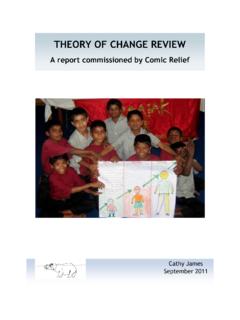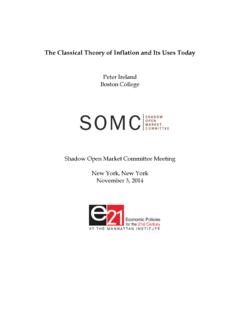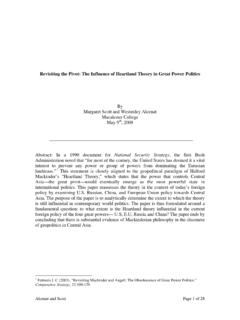Transcription of PACE Theory of Change: Discussion Paper - Actknowledge
1 PACE Theory of change : Discussion Paper Prepared by Zabi Rahat and Eoin Collins Center for Theory of change November, 2015. New York, NY 10016. Center for Theory of change Introduction The following Discussion Paper has been prepared by the Center for Theory of change to assist the PACE program in Macquarie University (MQ) in the articulation of its Theory of change (ToC). This ToC is a component of the PACE development and evaluation strategy. The Theory of change to date has articulated an overall goal for PACE. This is that MQ. students, staff, partners and graduates are actively engaging in social, economic, political, and environmental changes in their own contexts to contribute to a more sustainable and peaceful world . It has then identified four key long term outcomes for achieving this overall goal, one of which relates to MQ graduates that MQ graduates are using their influence to create positive changes with others.
2 This Discussion Paper is based on a review of research that has focused on this fourth long term outcome, with a particular aim of documenting research relating to some of the key preconditions identified by PACE for achieving it. These include employability, development of positive values, promoting respect for diversity and the role of civic engagement in equipping graduates to have influence and to use this influence to create positive change with others. Within each of these spheres, the Paper also reviewed research on enabling conditions within the universities to support the achievement of these preconditions. These are summarized as follows and then explored in more detail: 1. Employability: It is clear that MQ graduates will not be in a position to create positive change in their chosen field if they are not employable to begin with. One consistent research finding that supports the priority that MQ and PACE attach to developing linkages with the community, including the business sector, is that employers are increasingly seeking graduates with employment experience specific to the chosen field of work.
3 The research also indicates changes in the concept of employability itself, with greater value being placed by employers on capabilities linked to having and applying positive social values. 2. Developing Positive Values: Employability may be a necessary precondition for a graduate to be in a position to influence positive change , but it is not necessarily a sufficient precondition for them to do so. The role of universities in creating an environment through which positive values can be developed by students and carried to the areas in which they work and live has been highlighted consistently. However, challenges have been noted. For example, how to ensure that students carry over the values that they develop in university into their work and lives as graduates. 3. Awareness and Respect for Diversity: Promoting awareness and respect for diversity in universities is an important part of the values that they seek to promote.
4 Respect for diversity is also an important factor in creating the conditions for key aspects of learning including creativity and innovation. By promoting respect for diversity, universities are also meeting a growing need, both from employers and from the wider community, for the skills 1. Center for Theory of change and awareness necessary to support diverse work places, diverse customers and diverse societies. 4. Civic Engagement and Active Citizenship in Higher Education: Research consistently shows that university graduates are more likely to be engaged with their communities. This has been related to the so-called college effect where the experience of going to college leads to an expanded social network of educated peers and greater exposure to civic norms and responsibilities. Promoting civic engagement therefore, can be a key precondition for supporting students to create positive change in the context in which they live and work.
5 Activities undertaken by universities to support such engagement include those focused on developing the institution's own connections with the community in which they are placed, experiential learning and service learning. The research strongly suggest the need for a comprehensive set of activities to promote active citizenship rather than focusing on a single initiative which may be necessary, but may not be sufficient for establishing a form of civic engagement that results in positive change . The brief review of research relating to each of these areas is outlined in more detail in the following sections. 1. Employability In line with PACE's Theory of change , it is clear that MQ students and graduates will not be in a position to contribute to positive change in spheres in which they work unless they are employable. There is a very significant body of literature on employability and its components.
6 This includes studies showing the increased importance of attributes that could be linked to creating positive change . Recent reports by the International Labor Organization (Brewer, 2013), the Chronicle of Higher Education (2013), the European Commission (Humber, Velden and Verhgen 2013) and the Organization for Economic Cooperation and Development (OECD. 2015) highlight the comprehensive elements of employability, noting that it takes more than academic achievement to secure suitable employment. Employability in their view also means that graduates are prepared and equipped with relevant professional experience, relevant skills and attributes that will help them succeed in the work force. An important finding from this research, given the emphasis of MQ and PACE in developing linkages with the community (including employers), is the growing importance attached to work experience related directly to the field in which a graduate is seeking employment.
7 The research also highlights the importance of interpersonal skills ( team work and communication skills) computer skills, graduates being internationally oriented and professional and personal attributes such as honesty and having a work ethic. The significance of key skills and of work place experience in enhancing them was highlighted in the European Commission study and in research undertaken in the particular context of Australia. For example, a survey conducted by Bond University on employability among graduates, faculty and employers found that students' engagement with relevant employment 2. Center for Theory of change contexts was rated most strongly by employers (Kinash and Crane, 2015). Employers surveyed distinguished between employment experience opportunities (for example, internships) that relate to the students discipline area (and provide an extension of their studies in that area) and those that are unrelated to their discipline.
8 The former were more highly valued by employers than the latter (2014:158). The impact of employer preferences (and a concern for greater employment outcomes) on the agenda of higher learning has been explored in another recent Australian study (Smith et al, 2014). The study focused in particular on the positive impact of work integrated learning (WIL). on employability. WIL incorporated placements and simulation of real work situations, but the research found that the impact of actual placements exceeded that of simulation. The research also identified some key aspects of the curriculum that contributed to quality outcomes. These included the authenticity of the placement or WIL activity, quality preparation (for both students and hosts), access to quality supervision and alignment of WIL activity and assessments to WIL appropriate learning outcomes (2014: 7). The Bond University survey highlighted some of the challenges in facilitating student access to employment opportunities that more directly promote employability in the area in which they wish to work.
9 For example, higher education personnel referred to lack of funding as a barrier to providing graduates with opportunities to practice in their areas of study (Kinash and Crane, 2015). Lack of funding may exacerbate existing inequities between students as more resourced students can avail of unpaid internships directly related to their field of study while poorer students may have to focus on less career relevant employment experience to support themselves in college. Similar findings on the importance of direct experience have emerged from other studies, although some suggest a much broader set of capabilities needed by students. For example Hinchliff and Jolly (2011), refer to the themes emerging from research on employability which they believe call into question the traditional mode of graduate employability comprising skills, competencies and attributes. What emerges is a four pronged concept of student identity.
10 That encompasses values, intellect, social engagement and performance (with performance defined as the ability to apply intellect and skills in the workplace and to deliver results). The authors conclude that the values universities are often concerned to foster - diversity, environmental awareness, the value of citizenship, an interest in culture and intellectual rigor - are also valued by employers (2011). Issues also emerge from the Hinchliffe and Jolly research that have implications for the enabling factors that can guide universities in promoting values that are sustained by students and which are valued by employers. For example, the authors stress the importance of experience in applying social values and ethics in real situations. Evidence of applying these values in practice indicates to the employer that the graduate is more likely to be aware of and respond 3. Center for Theory of change to the normative environment in which the business operates (2011:576).








